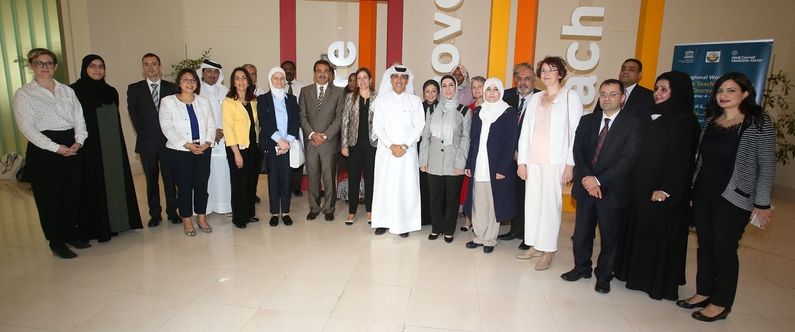WCM-Q hosts regional UNESCO ethics teacher training course
 The course taught participants the principle methods and methodologies for the teaching of ethics.
The course taught participants the principle methods and methodologies for the teaching of ethics.
Weill Cornell Medicine-Qatar has hosted a regional teacher training course on the subject of ethics in collaboration with the UNESCO Office for the Gulf States and Yemen, UNESCO Beirut and the Qatar National Commission for UNESCO.
Twenty-five participants from Qatar and the wider region convened at WCM-Q for the four-day Regional Ethics Teacher Training Course, which is designed to advance pedagogical capacity for ethics teaching and improve the quality of ethics education around the world. The course forms part of a multifaceted capacity-building strategy designed to help UNESCO Member States address ethical issues arising from rapid progress in medical and life sciences.
The program was opened by Dr. Ibrahim Bin Saleh Al-Nuaimi, undersecretary of the Ministry of Education and Higher Education, Dr. Khaled Machaca, WCM-Q associate dean for research, and Dr. Anna Paolini, director of the UNESCO Doha office.
The course, which was jointly hosted by WCM-Q’s Division of Continuing Professional Development and the Research Division, taught participants the principle methods and methodologies for the teaching of ethics, identified key learning resources, and provided assessment and feedback on the teaching skills of each participant, under the guidance of experienced teachers. The highly interactive course featured lectures, group work, individual demonstrations, and group discussions, led by trainers of the UNESCO bioethics team. Among the topics addressed by the course were patient rights, privacy, confidentiality and informed consent; the UN Universal Declaration on Bioethics and Human Rights; dignity and ethics for professional educators; and bioethics teaching in the Arab World.
Speakers at the event included Dr. Paolini; Dr. Mohammed Ghaly, professor of Islam and biomedical ethics at the Research Center for Islamic Legislation & Ethics; and UNESCO program specialist for social and human sciences Dr. Seiko Sugita. Three UNESCO training specialists delivered the course content: Dr. Mohamed Salah Ben Ammar, Dr. Marie Genevieve Pinsart and Mr. Alan Leroux. Participants included university professors, researchers, and supervisors at the Ministry of Education and Higher Education engaged in ethics teaching, among others.
Dr. Thurayya Arayssi, WCM-Q senior associate dean for medical education and continuing professional development, said: “Ethical behavior demonstrates our commitment as physicians, researchers and healthcare professionals to always act in the very best interests of patients and research subjects. As such, a sound understanding and a solemn appreciation of ethics is absolutely fundamental to the correct practice of medicine and biomedical research. WCM-Q is therefore delighted to be able to host this vitally important UNESCO training course to help enhance the teaching of ethics in Qatar and the wider region.”
Dr. Machaca gave the welcome address at the event. He said: “Qatar has experienced extraordinary growth in its healthcare and biomedical research sectors in recent years, establishing itself as a leading research hub in the region. During this period of rapid growth, Qatar has shown resolute commitment to ensuring the rights and dignity of those using the healthcare system and those generous individuals who chose to participate in human subject research for the greater good. This important course will contribute significantly to enhancing and facilitating the ethical issues at play.”
Dr. Anna Paolini, director for UNESCO Doha office, stated: ”Ensuring the equitable distribution of the benefits of science as well as ‘health wealth’ to address inequalities within and among nations, is a central challenge to achieving the 2030 Development Agenda. In the Arab region, while bioethics is gaining recognition as an effective means to address ethical conflicts in medical treatments and research, actual interpretation and implementation of universal principles in practice differ and are influenced by cultural aspects. This requires further reflection on social norms and the economic context in each country. Capacity development of national stakeholders, academic and policy-making mechanisms is the core of UNESCO’s support to our Member States.”
Dr. Sugita stated: “UNESCO’s Ethics Teachers' Training Course (ETTC) is designed to advance pedagogical capacity for ethics teaching and improve the quality of ethics education around the world. Building on the Universal Declaration on Bioethics and Human Rights of 2005, the course promotes interdisciplinary and multiculturalistic approach in addressing bioethics challenges and networking of ethics teachers in the Arab region.”